- Home
- Ian McDonald
Desolation Road dru-1 Page 17
Desolation Road dru-1 Read online
Page 17
The challenge was born. To the man who could defeat him Limaal Mandella would give him his crown, half his personal riches, and his word that he would never touch a cue again. Of the man he defeated he asked only that he bow and acknowledge the victor. The challenge went out on the airwaves of Glenn Miller’s Sunday evening Big Band Hour and the nine continents rose to meet it.
And the challengers, they are another list.
There were young men, old men, middle-aged men, tall men, short men, fat men, thin men, sick men, healthy men, bald men, hairy men, cleanshaven men, bearded men, men with moustaches, men without hats, black men, red men, brown men, yellow men, off-white men, happy men, sad men, clever men, simple men, nervous men, confident men, humble men, arrogant men, serious men, laughing men, silent men, men who liked to talk, straight men, gay men, men who were both, men who were neither, blue-eyed men, brown-eyed men, green-eyed men, radar-eyed men, bad men, good men, men from 0 and Meridian and Wisdom, men from Xanthe and Chryse and the Great Oxus, men from Grand Valley and Great Desert and the Archipelago, Transpolaran men and men from Borealis, the men of Solstice Landing, men from Llangonnedd and Lyx, from Kershaw and Iron Mountain, men from Bleriot and Touchdown, men from great cities and tiny hamlets, men from the mountains and men from the valleys, men from the forests and men from the plains, men from the deserts and men from the seas; they came and they came and they came until the towns were emptied and the machines stood idle in the factories and the crops filled and ripened in the fields under the summer sun.
The old men came, the old ores with death in their eyes who reminded Limaal of his Grandfather Haran, and the women, the wives and lovers and strong ones who bore the weight of the world on their backs, the great, strong women of the nine continents and the children came, out of the schools and nurseries and play groups, with cut-down cues and beer boxes to stand upon as they took their shots.
Limaal Mandella beat them all.
There was not a man, woman, child on the planet who could beat Limaal Mandella. He was the Greatest the Universe Had Ever Known. And when the last challenger had fallen, he stood upon the table, held his cue above his head in his two hands, and proclaimed, “I am Limaal Mandella, the Greatest Snooker Player the Universe Has Ever Known: who is there, man or god, who will challenge me, who is there mortal or immortal, sinner or saint, that I cannot defeat?”
“I am the one, I am he. Play me, Limaal Mandella, and learn some humility, little crowing cockerel.”
The speaker stood up so that Limaal Mandella might see his challenger. He was an elegant olive-skinned gentleman, dressed in red satin and leaning on a cane as if a trifle lame.
“Who are you who would challenge me?” boasted Limaal Mandella.
“I am not required to give my name, only to challenge you,” said the elegant man; indeed, he did not need to give his name, for a momentary flicker of hellfire in his black satin eyes identified him to all: Apollyon, Put Satanachia, Ahriman, the Goat of Mendes, Mephisto(pheles), Archfiend, Antichrist, Hermes Trismegetus, Old Clootie, the Adversary, Lucifer, Father of Lies, Satan Mekratrig, Diabolus, the Tempter, Old Nick, the Serpent, Lord of the Flies, the Old Gentleman, Satan, the Enemy, the Devil, the evil which needs no name to cover it.
Perhaps Limaal Mandella was too drunk on victory to recognize his enemy, perhaps his rationalism forbade him to permit the gentleman’s infernal incarnation, perhaps he could just not resist any challenge, for he cried, “How many frames? By how much do you wish to be humiliated?”
“The best of seventy-six?” suggested the Enemy.
“Done. Toss for break.”
“One moment. The stakes.”
“Same as for any other challenger.”
“Not quite enough, if you’ll pardon me. If you win, Satan Mekratrig will bow the knee to you, Limaal Mandella, but if you lose, he will take your crown, your riches and your soul.”
“All right, all right. Enough theatrics. Heads or tails?”
“Tails,” said the Enemy, smiling to his Infernal self. Limaal Mandella won the toss and broke off.
Very soon Limaal Mandella found himself pitted against an opponent the like of whom he had never met before. For by his once-divine nature, all human wit and science were the Enemy’s to use and abuse, though for reasons of demonic honour inexplicable to humans but binding upon devils and Panarchs, he could not use these supernatural wisdoms to improperly influence the game. His natural powers were still sufficient to battle Limaal Mandella to a standstill. The tide of combat surged back and forth across the green baize; here the Enemy led by two frames, there Limaal Mandella pulled back the deficit and went one ahead. There were never more than a handful of frames separating the combatants.
Every four hours they would take a sixty-minute break. Limaal Mandella would eat or bathe or drink some beer or catch a few winks of sleep. The Enemy would sit alone in his chair and sip from a glass of absinthe topped up by a nervous bartender. As word passed around the corridors and alleyways that Limaal Mandella was playing the devil for his very soul, crowds of the curious pressed into Glenn Miller’s Jazz Bar, concentrated and compressed almost to the point of suffocation and implosion, mounted policemen rode back and forth along the boulevard outside, keeping the crowd away from the doors. Teenage runners hotfooted it to the press agencies with the latest frame scores and excited Belladonians watched posters go up reading “Mandella leads by one frame” or sat in bars and cafes listening to Maelstrom Morgan’s radio commentary on the epic contest. In barber shops, sushi bars, bath houses, and rikshas the city of Belladonna cheered on the Greatest Snooker Player the Universe Had Ever Known.
But the Greatest Snooker Player the Universe Had Ever Known knew that he was losing. The quality of his play strained the credible, but he knew he was losing. There was a dreadful precision to the enemy’s shots, a foresightedness to his play that echoed the omniscient, and Limaal Mandella knew that play as he might, his human talent could never match the demonic perfection of Satan. He lost the initiative, slipped behind, and began to trail the Devil, always making up the frame’s deficit to stay in touch with the match but never forging ahead to take control of the table. The cries and shouts of the well-wishers now held a note of desperation.
After thirty-two hours at the table Limaal Mandella was a man destroyed. Haggard, unshaven, fatigue oozed from every pore as he bent to the table again. Only his rationalism, his unshakable faith that skill must triumph over dark sorcery in the end, kept his cue arm moving.
The final frame ground into play. The third change of referees announced the frame score: Limaal Mandella 38 frames, the Challenger 38 frames. The game was down to the colours. Limaal needed blue, pink, and black to win. The Enemy needed black and pink. Sipping his absinthe, he was as fresh and bright as a dandelion in a summer hedge. The green baize universe with its tiny coloured solar systems swirled before Limaal Mandella’s eyes, and suddenly it was a black ball game. Limaal took a deep breath and let the dregs of his rationalism flow through him. The black ball glided alone the table, wriggled in the jaws, wriggled free.
The audience moaned.
The devil sighted down his cue. And then Limaal Mandella had it. He stood on his side table, pointed his cue at the Enemy, and shouted, “You can’t win! You can’t win, you’re not real! There is no devil, there is no Panarch, no St. Catherine, there is only us, we ourselves. Man is his own god, man is his own devil, and if I am being defeated by the devil, it is by the devil within me. You are an impostor, an old man who dresses up and says ‘I am the Devil’ and you all believe him! We believe him! I believe him! But I don’t now, I don’t believe in you! There’s no room for a devil in the rational world!”
The referee tried to restore the contemplative calm of the snooker hall. Glenn Miller’s Jazz Bar settled after the untoward outburst. The Goat of Mendes sighted down his cue once more and struck. Cue ball struck black ball, black ball ran toward the pocket. As the balls ran down the table, the hellfire flickered in the gentleman�
��s eyes and snuffed out. The infernal power, the unworldly perfection, had gone out of him, wiped away by Limaal Mandella’s act of unbelief. The city of Belladonna held its breath. The black ball was losing momentum, losing impetus. A breath short of the pocket the black ball came to rest. There was utter silence. Even gabbling garrulous Maelstrom Morgan fell silent, words frozen in his microphone. Ten kilometres tall, Limaal Mandella stepped to the table. The city of Belladonna let out a shriek of anticipation.
Suddenly the Devil was just a tired, scared old gentleman.
Limaal Mandella swept his cue down into the striking position, oblivious of the fatigue tearing at every muscle. The room fell quiet again, as if his gesture had stopped time. His arm pistoned back, the same precise machine motion that he had performed ten thousand identical times in the past day and a half. He smiled just for himself and let the cue barely touch the ball. The white ball rolled down the table and stroked the black ball soft as a lover’s caress. The black shivered and tumbled into the pocket, like the plummeting porcelain planetoids of his nightmares.
31
After she walked away from Mikal Margolis at a soba bar in Ishiwara Junction, Marya Quinsana pointed her heart in the general direction of Wisdom and let her freedom waft her away.
Freedom. She had been so long the prisoner of other people’s needs that she had forgotten the flavour of freedom. But freedom had a taste. It tasted like a centimetre of Belladonna brandy in the bottom of a glass when you think the glass is empty. It tasted like hot soba noodles with gravy on a cold morning after a colder night. It tasted so good that she got up from her breakfast and walked away from Mikal Margolis, away from the soba bar, across the street where the old men aimed jets of brown hemp juice at a battered brass spittoon to the freight train slumbering in the siding. She felt Mikal Margolis’s eyes on her every step as she went up to the cab where two engineers, neither more than ten years old, loafed, waiting for the signal.
“Any chance of a ride?” she asked. As the two paan-chewing youths looked her up and down, she shot a glance across the street to MacMurdo’s soba bar and was regarded by Mikal Margolis’s betrayed eyes behind the glass window.
“Might say the same to you,” said the dark brown engineer-boy whose cap bore the name Aron.
“Sure. Why not?” Marya Quinsana rolled the flavour of freedom around her mouth like rolled up paan leaves. Whoring was small change in the currency of ambition.
“In that case, sure, why not?” Engineer Aron opened the cab door. Marya Quinsana climbed up and sat between the suddenly tense boy engineers. The signal changed, the tokamaks roared, and the train pulled away from Ishiwara Junction.
Changing trains in the dawn hours, waiting for half days on end at the side of Grand Trunk Roads holding aloft the totem of the windswept thumb, hitching rides on overnight transport dirigibles, Marya Quinsana pursued the ghost of freedom across half the world until she caught up with it in a freight siding behind l’Esperado Main Station.
The train was shabby, paint-peeled, and dowdy, eroded by years of exposure to the marvellous and wonderful, but Marya Quinsana could make out the legend by the yellow sodium glow: Adam Black’s Travelling Chautauqua and Educational ’Stravaganza. A small crowd of station bums stood idly around at the foot of the steps, lacking even the small change to share in the wonders of Adam Black’s show. Marya Quinsana could not have said what it was that made her go there that night; perhaps mellow nostalgia, perhaps some atavistic urge, perhaps the desire to pick at scabs. She pushed the bums aside and entered. Adam Black was a little greyer and a little sadder but otherwise unchanged. It pleased Marya Quinsana that she should know him and that he should not know her.
“How much is it?”
“Fifty centavos.”
“In cash or kind. As ever.”
Adam Black regarded her with the expression of one trying to place a memory. “If you will come with me, I will show you the wonders of my Hall of Mirrors.” He took Marya Quinsana by the hand and led her into a darkened carriage. “The mirrors of Adam Black’s Hall of Mirrors are no ordinary mirrors, they have been cast by the Master Mirror Moulders of Merionedd who have refined their art to such a pinnacle of perfection that their mirrors reflect not the physical image, but the temporal one. They reflect chronons, not photons, time images of the myriad possible futures that may befall you, which diverge through time when the searcher gazes upon them. To you they will display the futures possible for you at life’s diverse junctures, and the wise man will mark, meditate and amend his life accordingly.” As he delivered his stale spiel, Adam Black had guided Marya Quinsana through a pitch-dark maze of claustrophobic twistings and turnings. With the conclusion of his speech he stopped.
Marya Quinsana heard him draw breath and then he declared, “Let light fall upon the future!”
The chamber was filled with gritty purple light cast from a peculiarly shaped lantern above their heads. By this strange lanternlight Marya Quinsana saw herself reflected a thousand thousand thousand times in an endless mirrormaze. The images were fleeting, fleeting, twisted away the instant the eye comprehended them by the complex mechanisms that kept the mirrors turning. Marya Quinsana learned that there was a trick of holding the images in her peripheral vision and by this visual deception she beheld numinous glimpses of her future selves: the woman in combat duns with the MRCW slung across her shoulder, the woman with the five children under her skirts and her belly swollen with the sixth, the woman noble and powerful in judge’s gowns, the woman naked upon the glycerine-filled bed, the woman weary, the woman joyful, the woman tearful, the woman dead… no sooner seen than turned away like strangers on a train, into their own futures. There were the faces of frustrated ambition, the faces of despair, the faces of hope, and the faces that have put away all hope because they know their present lot is the most they can ever possess: there were the faces of death, a thousand faces bloody or ashen pale, seared black like coals or burst into festering boils by disease, sunken by age and wasting or calm with the false tranquility death grants those who fight it most.
“Death is every man’s future,” said Marya Quinsana. “Show me the futures of the living.”
“Look here then,” said Adam Black. Marya Quinsana looked where he pointed and saw a laughing sardonic figure glance over her shoulder at her and walk away into the maze, stepping from mirror to mirror with the easy gait of the jaguar, power slung low in her belly. She walked with the steps of the powerful; the makers and moulders of worlds walked like that. It was the image of how she had always imagined herself.
“That’s the one I want.”
“Then walk forward and take it.”
Marya Quinsana stepped forward in pursuit of the future self and with every step she took, confidence swelled up in her like a bud. She broke into a run, the run of the huntress, and as the mirrors swung out of her way to show only empty reflections of each other, she saw her prey was slowing. The power and authority were ebbing out of the image’s steps into her own. Marya Quinsana drew to within an arm’s reach of the fleeing image.
“Got you!” she declared, and seized the image’s shoulder in an arresting grip. With a gasp of terror the image wheeled and she saw herself as she had been, certain yet uncertain, knowledgeable but ignorant, a slave to freedom, and she knew that at some time in the pursuit she had become the image and the image her. The image collapsed with a pop of inrushing air into glittering dust and Marya Quinsana found herself by the entrance to the Hall of Mirrors once more.
“I trust you found the experience rewarding,” said Adam Black politely.
“I think so. Here, I forgot, fifty centavos.”
“For you, madam, there is no charge. For a satisfied customer, there is never a charge. Only the dissatisfied pay. But then, they always pay, don’t you think? But now I think I remember you, madam, your face seemed familiar to me; have you any connection with a place called Desolation Road?”
“Long ago and far away, I fear, and I am not the
woman now I was then.”
“Such can be said of us all, madam. Well, a good evening to you, thank you for your patronage, and if I might ask one favour, it would be for you to pass on to your friends and relatives the fascinations of Adam Black’s Travelling Chautauqua and Educational ’Stravaganza.”
Marya Quinsana crossed the tracks toward a sodium-lit siding where a chemical train with “Wisdom” on its tankerboards was powering up its fusion engine. It began to rain, a thin, cold, needling rain. Marya Quinsana tumbled the images of what she had seen over in her head. She knew what she was now. She had a purpose. Freedom was still hers, but it was a purposeful freedom. She would seek responsibility, for freedom without responsibility was worthless, and to that duality she would add power, for responsibility without power was impotence. She would go to Wisdom and enthrone the trinity of liberties within herself.
Close to the chemical train now she could see the engineer waving to her. She smiled and waved back.
Two peculiarities of the evening could not be fitted into her scheme. The first was that Adam Black’s reflection had not shown in any of the time mirrors. The second was that the image she had embraced had been walking in the general direction of Desolation Road.
32
Ever since her father’s ghost had told her she was a changeling, Arnie Tenebrae had refused to live under the same roof as either of her parents, living or dead. If she was a Mandella, she would live a Mandella in the Mandella household. She found Grandfather Haran asleep on his porch among his seedlings (for of late he had developed a passion for gardening, born in part out of his frustrated fatherhood). His mouth was wide and snoring. Arnie Tenebrae popped a hot chili pepper in the open mouth, and when the fire and fury had been extinguished, curtsied and said, “Mr. Mandella, I am your daughter, Arnie.”

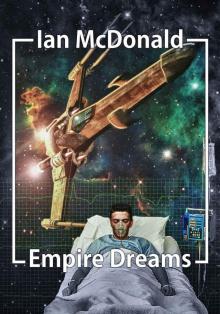 Empire Dreams
Empire Dreams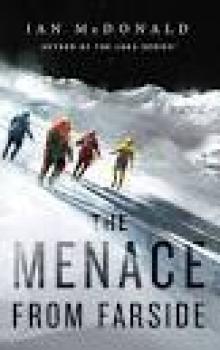 The Menace from Farside
The Menace from Farside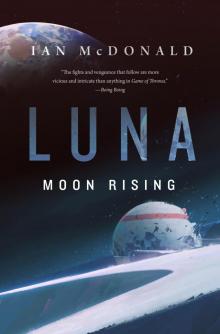 Luna: Moon Rising
Luna: Moon Rising Moon Rising
Moon Rising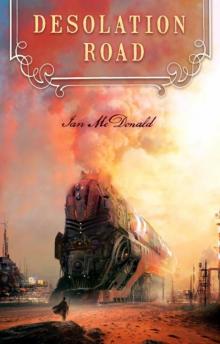 Desolation Road dru-1
Desolation Road dru-1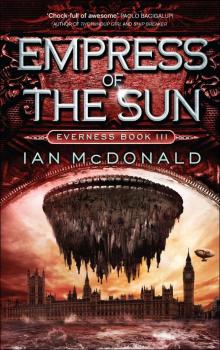 Empress of the Sun
Empress of the Sun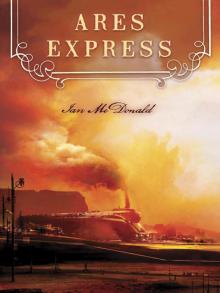 Ares Express dru-2
Ares Express dru-2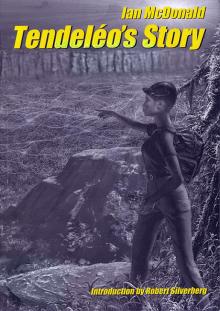 Tendeléo’s Story
Tendeléo’s Story River Of Gods
River Of Gods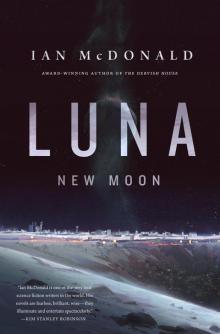 Luna
Luna![Cyberabad Days - [River of Gods 02] Read online](http://i1.bookreadfree.com/i1/03/29/cyberabad_days_-_river_of_gods_02_preview.jpg) Cyberabad Days - [River of Gods 02]
Cyberabad Days - [River of Gods 02]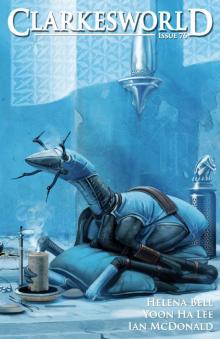 Clarkesworld Magazine Issue 76
Clarkesworld Magazine Issue 76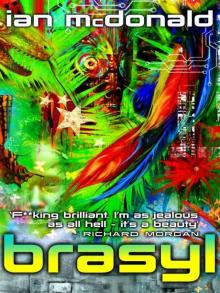 Brasyl (GollanczF.)
Brasyl (GollanczF.)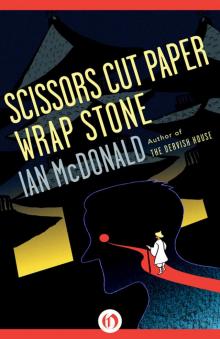 Scissors Cut Paper Wrap Stone
Scissors Cut Paper Wrap Stone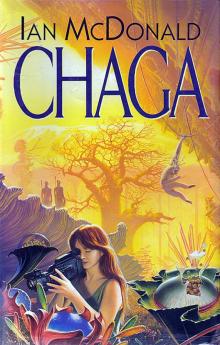 Chaga
Chaga Time Was
Time Was Cyberabad Days
Cyberabad Days Be My Enemy
Be My Enemy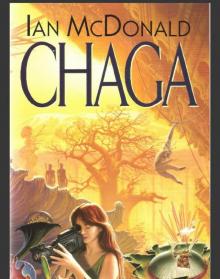 Changa
Changa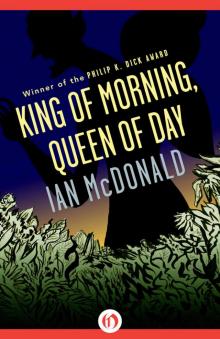 King of Morning, Queen of Day
King of Morning, Queen of Day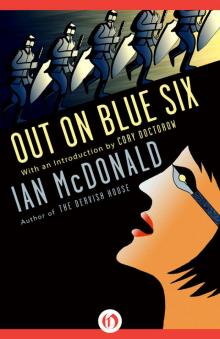 Out on Blue Six
Out on Blue Six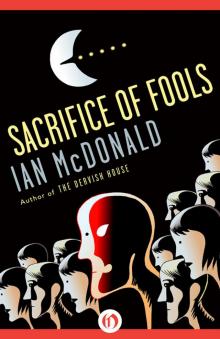 Sacrifice of Fools
Sacrifice of Fools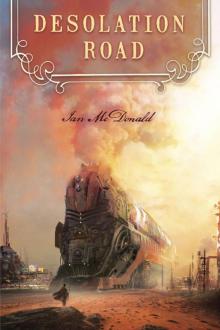 Desolation Road
Desolation Road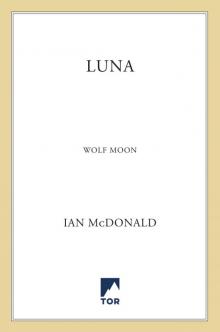 Luna--Wolf Moon--A Novel
Luna--Wolf Moon--A Novel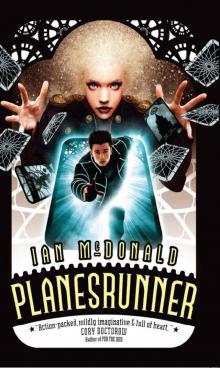 Planesrunner (Everness Book One)
Planesrunner (Everness Book One) Ares Express
Ares Express